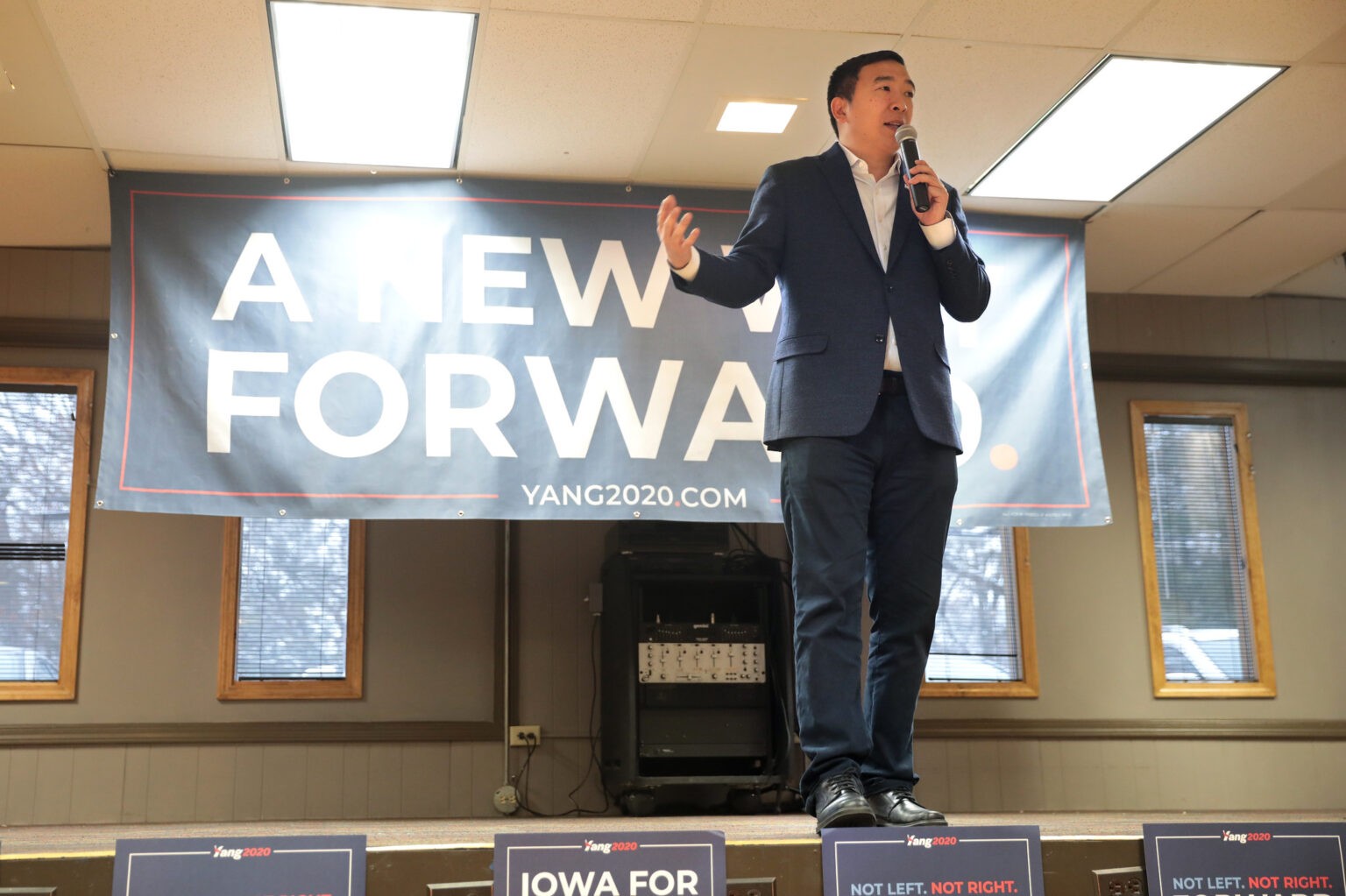Let’s play a little guessing game. Who wrote this tweet? “Liz Cheney has demonstrated leadership and character at a higher level than just about anyone in American politics.”
No, it wasn’t the Washington Post’s resident “principled conservative” Jennifer Rubin. Nor was it written by Joe Scarborough, a guy who fills pretty much the same “principled conservative” role but for the more middlebrow MSNBC. So is it, perhaps, from a lifelong Democrat who bemoans the absence of “decency” and a respect for “norms” in American politics? Could it be Adam “Pencil Neck” Schiff? Or perhaps Nancy Pelosi? Hell, at this point one wouldn’t be surprised if Alexandria Ocasio-Cortez, on a break from livestreaming on Twitch, had blurted out this apologia for the neoconservative spawn of Dick Cheney.
All wrong. The tweet came from Andrew Yang, the founder of the brand new Forward Party.
In 2020 Yang had run a longshot campaign for the Democratic presidential nomination before crashing and burning in the New Hampshire primary (he also failed in far friendlier waters by coming in fourth during the 2021 New York City mayoral Democratic primaries). During the presidential primary race, Yang was notable for carving out a niche among the crowded field of candidates by arguing that his appeal with Trump supporters was the broadest. But besides his advocacy for a guaranteed Universal Basic Income of $1,000 per month for each American adult, Yang rightly sought to direct the attention away from the pathological hatred exhibited by Democrats and their allied media for Donald Trump, and toward the fate of truck drivers and factory workers in states like Iowa and Ohio, which had swung heavily toward Trump in 2016.
Alas, his courting of Trump voters was insincere, after all. When asked at an MSNBC-sponsored presidential debate what he’d say during his first call with Russian president Vladimir Putin, Yang quipped that he’d say “I’m sorry I beat your guy.” The line was favorably received by the live audience because by then, many Democrats had convinced themselves that an international spying operation had cost Hillary Clinton the presidency. In a way, Yang’s debate line was smart politics; after all, the rule goes that you play to the base in the primaries and then pivot to the moderates after clinching the nomination. But Yang is free of these pressures now, and yet he still appears to be targeting the decidedly puny fraction of Americans who care about Russiagate and regard Liz Cheney as a bedrock of integrity as the base of his political project.
If that’s where he seeks to generate the momentum for the Forward Party, the endeavor is doomed from the start. The party’s name is a callback to Yang’s 2020 presidential slogan, “Not Left. Not Right. Forward.” It spoke to the exhaustion with the simplified blue-red divide that has been driving American politics for decades. Positioned in the same direction that Hillary Clinton’s 2016 campaign logo pointed toward: some better tomorrow that awaited us, if only the right solutions-driven technocrats were in charge.
And as for the personnel that make up this “Forward Party,” there is for one its co-founder, Miles Taylor. You might know him as “Anonymous,” who authored the infamous 2018 New York Times op-ed titled, “I Am Part of the Resistance Inside the Trump Administration.” The article delighted anti-Trump forces in politics and the media at the time. The introduction described the unnamed author as a “senior official in the Trump administration.” Speculation, naturally, followed: Who was this brave and mysterious mole? One popular guess was Vice President Mike Pence, who had been urged to take the job by establishment Republican forces around then-speaker Paul Ryan. But just before election day 2020, it was revealed that the author was in fact the 31 year-old Miles Taylor, whose “senior” position in the Trump administration amounted to little more than deputy chief of staff for then-Homeland Security secretary Kristjen Nielsen.
So what compelled Taylor to “resist” Trump? He begins the article by proclaiming that he and his nameless conspirators’ “first duty is to this country,” and that Trump “continues to act in a manner that is detrimental to the health of our republic.” But most of the piece appears animated by disagreements over policy. “Although he was elected as a Republican,” Taylor complains, “the president shows little affinity for ideals long espoused by conservatives: free minds, free markets and free people.” Trump’s betrayal of free market principles expressed itself, Taylor claims, through “impulses” that were “generally anti-trade.” He also notes that Trump complained for weeks about senior staff members encouraging confrontation with Russia by continuing to impose sanctions. Naturally his national security team, Taylor among them, “knew better.” “[S]uch actions had to be taken, to hold Moscow accountable.” Notice the impersonal passive voice. Trump’s less-than-belligerent outlook on foreign relations had been backed in the 2016 election by a war-weary public that had seen American lives and treasures squandered on senseless wars. If anything, Trump acted well within this democratic mandate to seek rapprochement with Russia—which made Taylor the one who ignored the will of the people. “This isn’t the work of the so-called deep state,” the article’s most famous line went. “It’s the work of the steady state.” Steady even in face of electoral signals imploring leaders to change course?
And now, Taylor tweeted last May, he’s “quitting the GOP” over its “vitriolic rhetoric.” The Forward Party is his new home. We ought not defend the GOP leadership to recognize that Taylor is mimicking the same alarmist rhetoric used by President Biden, who has called white supremacy “the most lethal threat to the homeland today.” The internal enemy is identified, a tyrannical anti-terror law to combat this supposed threat allegedly already in the drawer, just awaiting the inevitable congressional rubber stamp and Biden’s signature. No wonder Yang was swooning over Liz Cheney whose father had been the architect of the first PATRIOT Act, of black sites, “enhanced interrogation techniques,” and destructive wars, measures she has vocally defended herself.
These then are the public stances taken by leaders of a party that otherwise claims to seek to tone down the rhetoric. But beyond adjusting the tenor of our political discourse, what does the Forward Party actually stand for? As of right now, that’s unclear. In a recent interview with The Atlantic, Yang was non-committal on policy. A planned party convention in 2023 is supposed to sort things out, and according to Yang, its orientation will be “centrist,” where indeed many Americans locate themselves. But the Forward Party is not an entirely empty container: In its current platform-less state the party is concentrating on promoting procedural changes to the way American elections are conducted, above all by advocating for ranked-choice voting as a way to replace the antiquated first-past-the-post, winner-take-all system that allows Democratic and Republican elites to flourish. As the political scientist Lee Drutman notes in his book Breaking the Two-Party Doom Loop, such procedural changes would allow voters to avoid the pitfalls of “lesser evilism,” where they’re faced with only two choices lest they “waste” their vote on untenable third party candidates. By allowing to rank the candidates on the ballot in the order of their true preferences, this new gained freedom of voters would force candidates for office to change their tune. Rather than appealing solely to their parties’ extreme flanks, candidates would campaign in a manner that might garner them perhaps second or third-choice votes. They would thus have to appeal to a broader set of voters, and the “purity tests” that have homogenized Republican and Democratic politicians would be a thing of the past. In other words, the desired outcome might be more political comity.
Fine. Most Americans have had enough of the “liberal” vs. “conservative” theatrics that have been ripping friends and families apart since at least 2016, if not before. But widespread comity has its own shortcomings. Take the case of Germany, which saw several varying coalitions on the national level in its recent history. Gerhard Schröder’s Social Democratic-Green Party coalition which governed Germany from 1998 onward was replaced in 2005 by a Christian Democratic-led government that took first the Social Democrats (SPD) as a junior partner, then for a few years the more free-market oriented FDP, and then the SPD again. The SPD is now back in charge, this time in coalition with the Greens and the FDP. Amid all these permutations, the nation’s major politicians have never accused each other of treason and seen no need to plot for street fighting to intimidate the opposition (remember that store windows in Washington, New York, Chicago, and other blue bastions were boarded up in November 2020 in case Donald Trump won the election).
And now Germany’s natural gas is running out and electricity bills are sky high. Because thanks to all the comity and long-term policy planning that survived the various four-year terms, most of the major parties had settled on a policy consensus that elections did nothing to sway. Absent any major contention for power by competing social forces, Germany’s leaders staked everything on phasing out nuclear energy and importing Russian gas. Recently, the country’s foreign minister Annalena Baerbock voiced concerns that the inevitable price squeeze on consumers might lead to “popular uprisings.” If they were to happen, they would certainly look less dramatic than, say, the 2020 riots in America. But the lesson is that political moderation is no foolproof way to avoid conflict. Instead, it may just be another way of inviting it.
Rhetorical moderation and inter-party goodwill say nothing about the class politics behind the consensus. Conservative critics complained that Merkel had “social democratized” the Christian Democrats. But really, she had greenified them by taking over the eco party’s core ideological positions, which were those of the educated managerial strata. Yang, too, is a warrior of that class. He’s made his millions in the standardized testing racket and regards automation as virtually the sole reason for the hollowing out of America’s industrial base. Unsurprisingly, his views on free trade are similar to Taylor’s. In other words, he’s a product and apologist of neoliberal myths, all the way down to the very fact that he was fond of referencing Milton Friedman on the 2020 campaign trail as one of his inspirations for his UBI advocacy.
The Forward Party, then, shows has all the signs of being the class project of slightly more sophisticated #Resistance types. The website states that the party opposes “purity tests” and that “we won’t be checking IDs to see if people are Democrats, Republicans, or Independents.” But some purity is necessary for the coherence of a political project, especially if it alleges to represent the majority of American workers who have been lumpenized, bled dry, and sacrificed to neoconservative “nation-building” projects in the post-Cold War era. After all, to borrow the old Groucho Marx joke, I wouldn’t want to belong to a club that would have Liz Cheney as a member.









